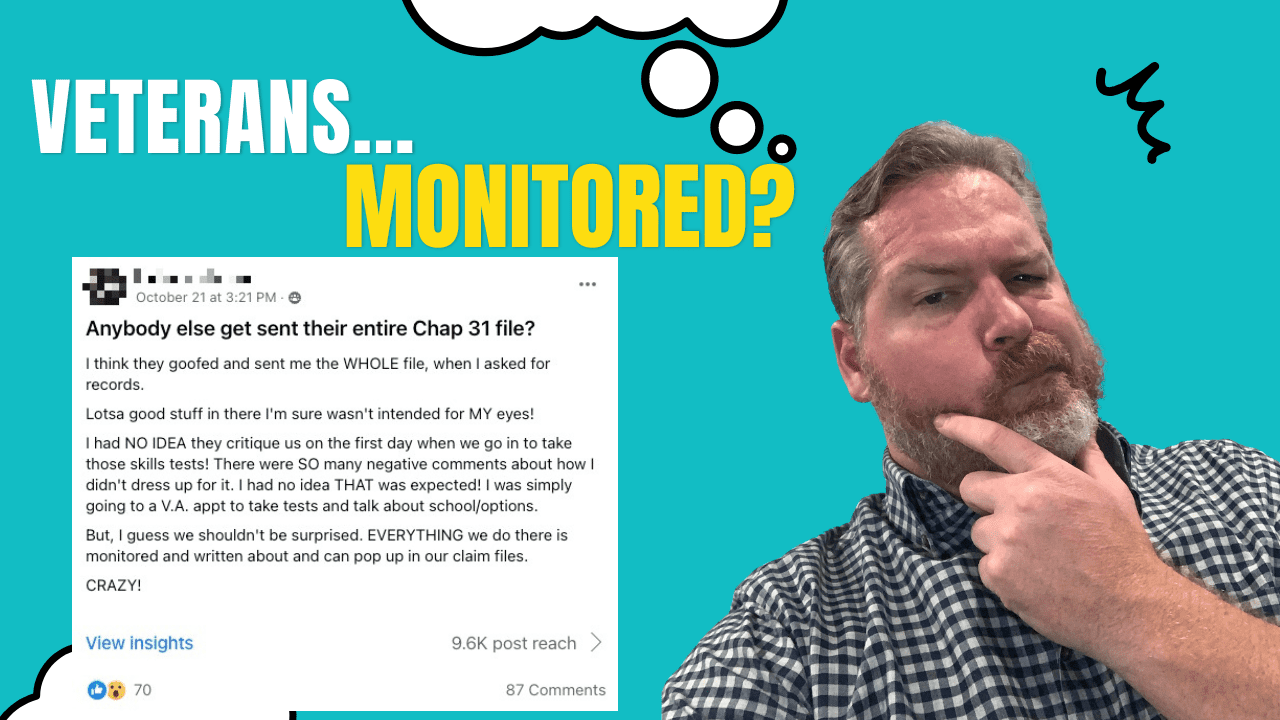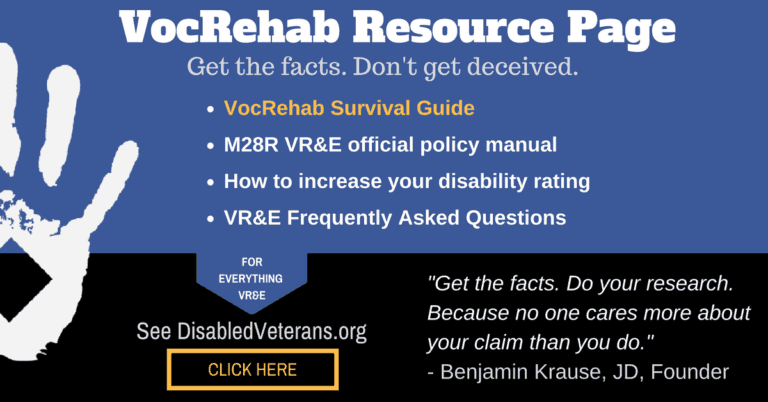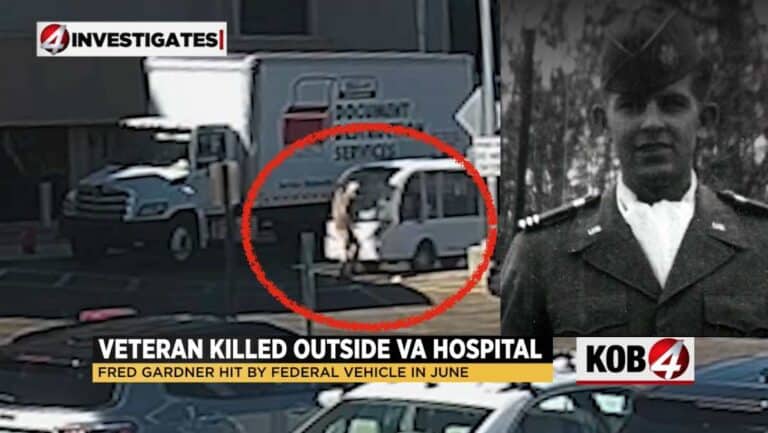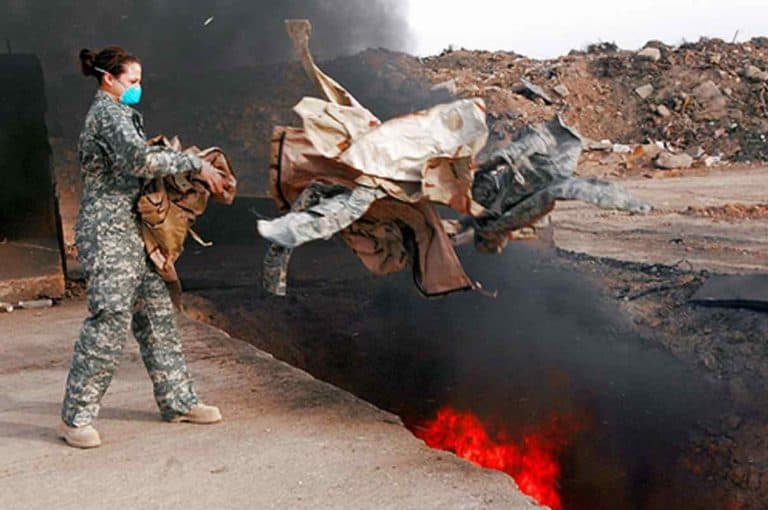Veteran Readiness Counselors Monitor ‘EVERYTHING’ You Do, Says Veteran
One veteran using Veteran Readiness and Employment was surprised last week to learn “EVERYTHING we do there is monitored and written about…”
Many veterans responding to the post were surprised about being “monitored.” They were also concerned that VA is not following consent requirements before conducting evaluations.
Before any evaluation, also called a forensic assessment or evaluation, a Veteran Readiness Counselor must secure written informed consent to collect sensitive and confidential information. VR&E does use a form, but that form does not satisfy written informed consent requirements. This may create an ethical quandary for the information taken and then used by the agency against veterans fighting for benefits.
But will VR&E change its ways to get written informed consent? Or, will they continue to let many unsuspecting veterans think they are presenting for a friendly therapy session with your buddy counselor?
RELATED: 3 Things You Must Do To Win Grad School In VR&E
Veteran Readiness Livestream
Veteran’s VR&E Experience
I’ll break this down in a second, but first, here is what the veteran had to say:
Anybody else get sent their entire Chap 31 file?
I think they goofed and sent me the WHOLE file, when I asked for records.
Lotsa good stuff in there I’m sure wasn’t intended for MY eyes!
I had NO IDEA they critique us on the first day when we go in to take those skills tests! There were SO many negative comments about how I didn’t dress up for it. I had no idea THAT was expected! I was simply going to a V.A. appt to take tests and talk about school/options.
But, I guess we shouldn’t be surprised. EVERYTHING we do there is monitored and written about and can pop up in our claim files.
CRAZY!
How To Make A VA Records Request
First of all, the veteran probably sent VA a Privacy Act request or Freedom of Information Act request or both for a copy of her VR&E file. The VR&E file used to be a paper file maintained at each regional office called a Counseling/Evaluation/Rehabilitation (CER) folder.
Documents contained in the CER folders about a person’s VR&E claim were digitized over the past few years. The program now stores those documents in VBMS, short for Veterans Benefits Management System. This is where VA stores what is called the Claims File or C-File.
GO HERE: Free FOIA Guide For Veterans
The VR&E file, formerly called the CER, is now housed within a C-File. Since the creation of VBMS until recently, a veteran’s records related to VR&E were not contained within the C-File. This omission most certainly resulted in some veterans not receiving the disability benefits because the VR&E file was not included.
I can go on and on about the back and forth I’ve had with the Board of Veterans Appeals to ensure the CER copies were included in the C-File, but I’ll save those stories for another day.
Initial Evaluation Report
Second, the veteran while reviewing the record came across the initial evaluation report and other documentation notes a VRC keeps on a veteran.
The VR&E program is supposed to follow various ethics rules. These ethics rules require notifying a person about the nature of the relationship.
The program has agreed to follow ethics rules promulgated by the CRCC, which stands for Commission on Rehabilitation Counselor Certification. This organization governs the conduct of Rehabilitation Counselors.
CRCC explains as the Scope of Practice within rehabilitation counseling as:
Rehabilitation counseling is a systematic process that assists persons with physical, mental, developmental, cognitive, and emotional disabilities to achieve their personal, career, and independent living goals in the most integrated setting possible through the application of the counseling process. The counseling process involves communication, goal setting, and beneficial growth or change through self-advocacy, psychological, vocational, social, and behavioral interventions.
There is more to it, but you get the gist of it.
VA calls your VRC a Veteran Readiness Counselor, now, but they were called Vocational Rehabilitation Counselors legally until 2022.
In case you are confused with the acronym soup, a VRC functions as a Rehabilitation Counselor, and most of them were trained into the specialty field through completion of a Master’s degree in Rehabilitation Counseling and a respective certification with the CRCC or similar. The CRC acronym stands for Certified Rehabilitation Counselor.
Is A Veteran Readiness Counselor A Type Of Therapist?
Third, veterans are not informed of what the “counselor” is doing and frequently confuse the role of the VRC with that of a traditional therapist who is also called “counselor.”
This is where things get dicey including for many veterans unaware of what the VRC is supposed to do with their case.
Due to a lack of information, many veterans attend their first meeting as part of the initial evaluation process without knowing what is happening. They do not know what they are saying is being logged into a system of legal records for use in legal adjudications until they die. Careless words spoken can and will be used against the veteran whenever it suits the counselor.
RELATED: Veteran Readiness And Employment Confusing Say Vets Surveyed
While the CRCC Code of Ethics reinforces that all CRCs are “bound to act in accordance with the Code,” many VRCs at VA including those who are CRCs sometimes fail to follow CRCC rules. This includes failing in the obligation to inform clients of the VRCs role and responsibilities.
Written Informed Consent To Monitor Veterans
Fourth, for more than a decade, VRCs were required to seek informed consent in writing prior to conducting an initial evaluation. Only in April 2021 did VR&E update its information form that tells the veteran the counselor “will conduct a comprehensive initial evaluation”. The veteran’s signature is required on the form.
But, the VA Form 28-0800 does not seek “informed consent,” which would require a consent line such as “By signing below, you consent to the comprehensive initial evaluation.”
Close but no cigar.
Prior to an initial evaluation, every veteran should be informed of what is about to happen and provide written informed consent since the process is a forensic evaluation. Despite changing the form, the agency still does not seek written informed consent.
VA requires a person to provide written informed consent prior to providing someone else with a copy of their records.
In Minnesota, a written informed consent form usually includes some grant of permission addressing the release and how the data will be used. For example, “I give my permission for FDA to release data about me to NIH as described in this consent form.” A Minnesota government agency must also provide a Tennessen warning notice on how data will be used.
In the VA Form 28-0800, VA provides no language indicating an evaluation is being consented to or permission on how any confidential or private data may be used.
Are Veterans Monitored?
Veterans are most certainly monitored by VA evaluators, examiners, police, Veteran Readiness Counselors, and any other VA employee with a grudge and access to a VA database on that veteran.
To our point, though, VRCs most certainly monitor veterans under their authority. This most certainly happens, but it’s part of required process to make a decision on whether a veteran is qualified for benefits.
That much is true and reasonable minus the grudge.
What is unreasonable is VR&E’s consistent failure to seek proper written informed consent from veterans so we understand what is going on and have the option to consent or not consent.
The ‘grant permission’ and ‘I consent’ part of most other consent forms is conspicuously lacking on the VA Form 28-0800 after over a decade of the form existing in various versions. Why does VR&E promote systems that keep veterans in the dark?
Some day, maybe we will learn why VA keeps veterans unaware of what VR&E is actually doing, that it’s a forensic examination, that the information in the evaluation can and will be used against you, and that the ‘counselor’ is not a therapist.
This kind of counselor is there to perform an insurance adjudication hit job on you.
In the end, VA is basically a large Workers’ Compensation insurance company for the Department of Defense.
VA used to be called the Bureau of War Risk Insurance (look it up) before that name proved too unpopular, perhaps – kind of like the Department of War that became the Department of Defense.
Do not go into any VR&E appointment thinking the VRC is your buddy. They are watching and monitoring you. What they see and write down will end up in your permanent file.
Get the benefits you need and get out.
See Post: https://www.facebook.com/groups/VocRehab/permalink/10160970612052269






Another thing people at the VA do is this…If you’re a conservative and an employee is left leaning you might be treated like shit. Same thing the other way around. If you are politically left and employee is conservative you might be attacked in some way. Character assassination, lies, and they’ll drag their nuts on you getting care. Has an employee ever been dinged over you? You’re gonna get retaliation. Do they see you as an undue burden or are you likely to be “a consistent problem” for them? They gonna get you out of there one way or another. Doesn’t matter if you’re a medal of honor winner or a two year air force flunky. These dogs are there to get paid and if you seem to be standing in their way somehow they’re gonna knock you down. You fk off and kill yourself well that’s not their problem. You were weak.
Should be a line of attorneys stretching from the front door of the VA all the way out to the parking lot. A gauntlet of lawyers and private security to go with veterans to their appointments. On hand, they can have laptops ready to file lawsuits on the spot if veterans are given trouble of any kind… instantly straight to the goddamn judge. Boom denial of care, boom abuse, boom lies in medical records (falsifying a federal record), boom PTSD inflicted by VA, boom civil rights violations. Bam Bam Bam one right after the other. Gonna have to appoint new judges.
If you don’t have family they gonna treat you like shit. Were you only in service for 4 years? They gonna use that against you. Do you take narcotic medication every month and call it in early so it arrives on time? They gonna use that against you. Does the doctor not like you for some reason? They gonna use that against you. Do you smoke pot? They gonna use that against you. Do you expect to be seen by primary care more than once a year? They gonna use that against you. Have you EVER got upset with VA employees? They gonna use that against you. Have you ever been charged with a crime? Oh boy they gonna use that against you. Are you 100% for PTSD 10 years out of service? They gonna use that against you. Are you estranged from your family? They gonna use that against you. Are you constantly complaining about something? They gonna use that against you. Are you suicidal? They gonna use that against you! Have you ditched VA completely other than benefits? They gonna use that against you.
Va falsifying records nothing new!
https://www.wyomingnews.com/news/local_news/va-accused-of-covering-up-patient-cause-of-death/article_d45e20f8-5493-11ed-9640-a7aeecd46bc8.html
Delay deny https://www.wfla.com/8-on-your-side/va-benefits-paid-after-delays-denials-and-death-of-tampa-veteran-breathe-life-into-gator-scholarship/
Yeah sometimes they’ll do character assassination and lies in notes for people who have things on the VA or because they just don’t like someone. Think of it as VA cancel culture. A little character assassination here, a line of character assassination there, some exaggeration or minimization of your situation whichever suits their purpose. Each doctor you visit might pick up on it and add to “their story” whichever way they are trying to spin in. After 10 years have passed, they’ve painted such a bad picture of you that you damn near get followed around the clinic or set-up during interviews like interrogation…and it becomes clear that the only way to protect your benefits and your safety is to not go! In this case, a veteran might be using his benefits to pay for healthcare so technically you aren’t benefitting from the VA at all!
I am a 90 year old korean war veteran with cancer. I have very little visual ability.
. I have been wating nearly three years for evaluation…I was schedualed August 3 but va did hit follow
on giving me requested doctors to use. AS a result MY EVALUATION WAS “DELAYED”. i AM NOT SURE MUCH “DELAY MEANS.I my case.supposted to be “top” of list” may be End of list
Hey Krause…what’s a “forensic examination” in the sense you are using it here? It seems from your (excellent) post that it is a specific *thing*, but I don’t understand how it’s different than an ordinary interview or the dozens of “sessions” (I don’t know what else to call them) the VA puts us through before we get access to various benefits they pretend to the public they are showering upon us.
For example, in Pain Management, there are biannual interviews with a random Pain Specialist, and any time one wishes to access new PM tools, one must face the Pain Management Committee (it has had lots of names, but is basically a collection of [interdisciplinary board] senior VA Dr.-Administrators who pass judgement). All of these are hoops to be jumped through in order to get access to the less-than-adequate facilities for Pain Management in the VA. To get a little electronic dingus that helps with migraines, for example, one must travel to the VA clinic three times for “trials” (while having a migraine, obviously), endure either the PMC (again) or “meet with” a random PM Dr., and then meet with Prothestics, and then maybe you get the dingus, or maybe not, but your Pain Meds get cut regardless (gotta meet those downward percentage goals).
Is it that kind of thing? Or more like the C&P boards?
Just trying to stay informed, for what little good it does. Thanks brother.